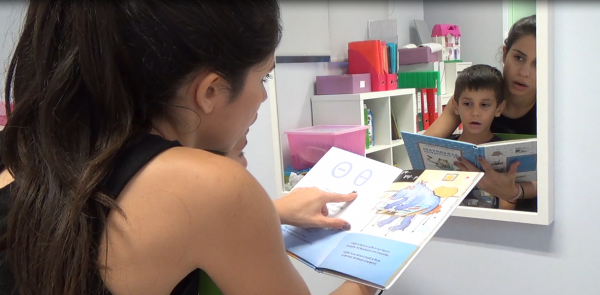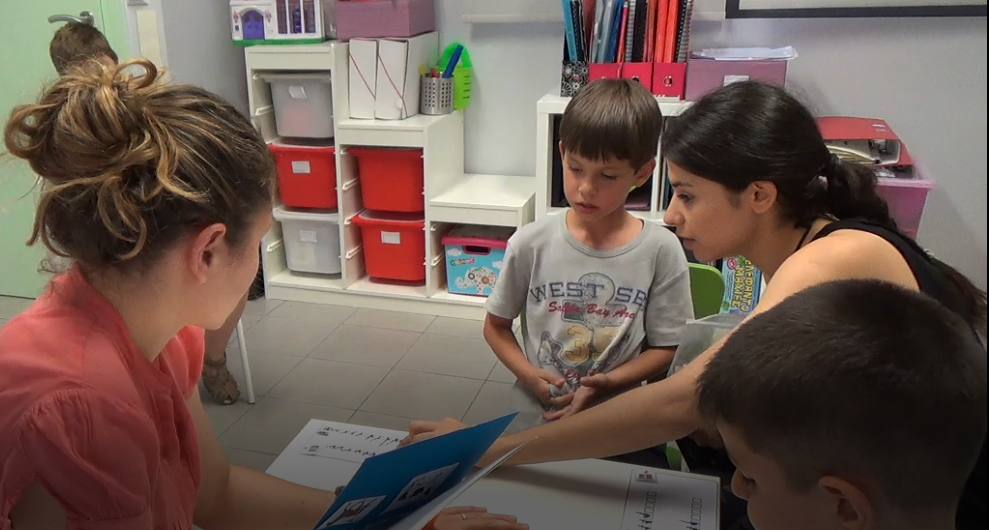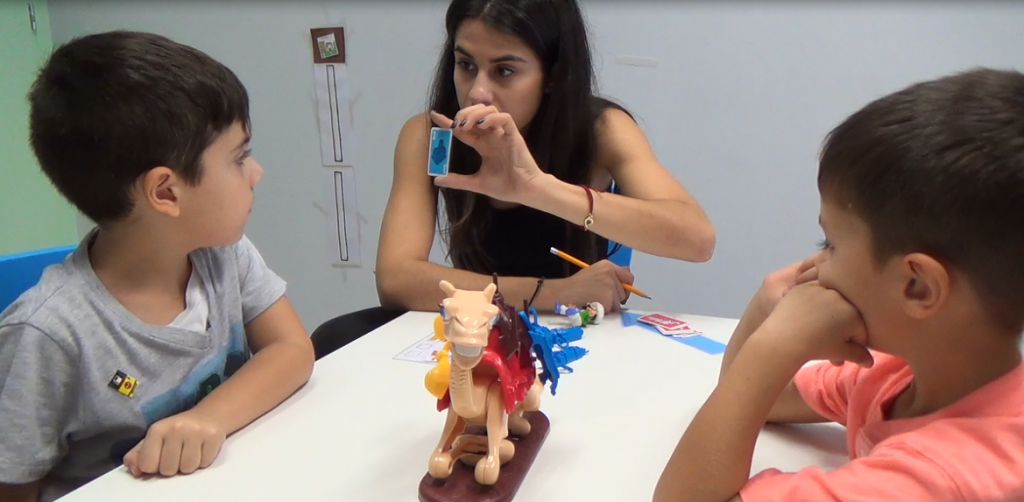Studying a PhD in Population Medicine: Children with Autism Spectrum Disorder (ASD) and Sensory Processing (SP) difficulties
9 November 2018
Eleni Glarou is based in the Centre for Trials Research. She won a competitive funded place for a PhD in Population Medicine: Understanding multi-party communication in therapy sessions for children with Autism Spectrum Disorder (ASD) and Sensory Processing (SP) difficulties: The value of interaction analysis.
Tell us a bit about yourself
My BSc (Hons) was in Speech and Language Therapy (2:1) at Technological Institute of Western Greece. My MSc was in Special and Inclusive Education (Distinction) at University of Bristol.
During and after my clinical practice, I was working with children with Autism Spectrum Disorder (ASD) and other conditions, supporting them in 1:1 and small group therapy sessions in clinical private settings and SEN/D schools in Greece and the UK. In addition to this, I was a Research Assistant in a fMRI project involving children with ASD at CRICBristol in collaboration with University of Bristol and the NHS. I like collaborating with other people and I enjoy working with children with SEN/D.
My main research interests are ASD, social interaction and communication interventions, collaborative work in healthcare, working with children and their parents/carers
During my childhood and adolescence, I was a track runner and I was participating in regional contests. I love indoor spinning, kickboxing and running.
What did you choose to do your PhD at Cardiff?
- PhD based in Centre for Trials Research – great opportunity not only to obtain a PhD, but also to be member of the Centre for Trials Research group and see how things working with the largest group of academic clinical trials staff in Wales.
- Cardiff University – one of the best universities in the UK
- School of Medicine competition Scholarship
- This project encompasses several elements related to children with ASD, multi-party communication in therapy sessions and parental involvement that I find extremely interesting.
- The supervisory team at Cardiff – high skilled people with great experience and experts in their fields.
Who is supervising you across Cardiff University?
- Dr Lucy Brookes–Howell is my lead supervisor and she is a Research Fellow (Qualitative) as well as the Head of Qualitative Research for the Centre for Trials Research, College of Biomedical & Life Sciences, Cardiff University.
- Dr Rachel McNamara is a chartered psychologist, Senior Research Fellow, Deputy Director for the Brain and Neuroscience at the Centre for Trials Research and leads the CTR Trial Managers Group.
- Professor Monica Busse is a chartered physiotherapist, trials methodologist and Director for Mind, Brain, and Neuroscience Trials in the Centre for Trials Research at Cardiff University.
- Dr Catherine Jones is a Senior Lecturer in the School of Psychology at Cardiff University and core member of WARC.
Where are you based?
I am based on the open plan area (7th floor) at Neuadd Meirionnydd building, Heath Campus at Cardiff University.

What is the title or area of your PhD?
PhD title: Understanding multi-party communication in therapy sessions for children with Autism Spectrum Disorder and Sensory Processing Difficulties: The value of interaction analysis.
This PhD project is a part of the SenITA project, using video-recordings from its dataset to explore how therapists communicate with children with ASD and their parents/carers and how their relationships alter over time.
This PhD is a competition PhD project in Population Medicine and funded by the School of Medicine, Cardiff University and based in the Centre for Trials Research (see appendix below for more information).
What populations will you be focusing on?
This project will be focused on ASD children, their parents/carers and their therapists. I will focus on those three different populations, since multi-party communication in healthcare contexts is an interesting and hot topic nowadays.
Why is this research so important and what gaps are you looking to fill in knowledge?
Based on a recent systematic review (Ooi et al., 2016) previous qualitative research, exploring experiences of parenting a child with ASD, based on methods that ask for reports of experiences, such as interviews, focus groups and open-ended questions. However, none of the reviewed studies (n=50) observed real life events of carer and child interactions. Thus, this PhD will attempt to provide a better understanding on how to include children with ASD in a child patient-carer-healthcare professional communication context in line with health equity goals.
What are you hoping your work might contribute?
This PhD project will increase knowledge about the way child-patients interact with therapist and parents/carer during therapy sessions. It will identify key components for a future intervention, in the form of practical recommendations, to improve communication and better include children with ASD and SP difficulties in therapeutic settings and beyond (e.g., classrooms). In addition to this, it will assist to better understand how interventions can generally be implemented in real-life contexts.

What is most of interest to you in your research?
The most interesting aspect of my research is that my PhD will use video-recordings of SenITA study dataset. Data of actual therapy sessions among therapists, the children with ASD and their parents/carers will be provided, something that I find interesting and rare. This will allow me to explore how therapists communicate with children with ASD and their parents/carers and how their relationships alter over 26 weeks. The most interesting aspect of this process will be that I will attempt to show not only what is and/or not said, but also how it is said.
Thank you Eleni!
Appendix – PhD Project Description
Sensory Processing (SP) difficulties are very common in children with Autism Spectrum Disorder (ASD). Children may be hyper or hypo-reactive to stimuli, which can result in behavioural difficulties, and poor motor control. There is substantial potential burden for children with ASD, and their carers and families in terms of the stresses and challenges of living with ASD, and the physical and psychological toll that meeting these challenges take.
The SenITA Randomised Controlled Trial compares manualised Sensory Integration Therapy (SIT) to Usual Care for primary school aged children with ASD and SP difficulties. SIT is a client-based approach that focuses on the therapist-child relationship and uses play-based sensory motor activities to influence the way the child responds to sensation. Carers play an important role in the therapy encounter as they participate to facilitate engagement and provide feedback on strategies they have tried at home.
The way ASD affects child patient-carer-healthcare professional communication has not been sufficiently examined in previous research. There is a need for greater understanding on how to include children with ASD in their encounters, consistent with health equity goals. Multi-party communication between child patient-carer-healthcare professional in the general healthcare setting poses challenges for healthcare professionals. Furthermore, previous qualitative research aimed at understanding the experiences of parenting a child with ASD typically rely on methods which ask for reports of experiences but do not look at real-life instances of carer and child interactions.
This study will have full access to the large, longitudinal SenITA dataset of video-recordings of real-life SIT sessions between therapist, child-patient with ASD, and carer(s) (sample size = 108 participants receiving 26 one hour sessions over 26 weeks). Rather than rely on therapists’ and carers’ accounts of therapeutic encounters, these data show not only what is actually said but how it is said. The student will carry out a discourse analysis of a sample (sample size and strategy to be defined in year 1 following literature review and scoping of dataset) of the SenITA video-recording dataset to explore how therapists communicate with children with ASD and their carers. This will include close study of how their relationship alters over time. More specifically, they will explore interactional strategies to achieve therapeutic alliance; the interactional role of children with ASD; management of clinical and everyday realities; and carer identity work.
The student will also carry out triangulation using different methods of interaction analysis. A smaller sub-set of data will be used to compare the results of discourse analytic methods with other interaction methods (e.g. Roter Interaction Analysis System, Medical Interaction Process System, Conversation Analysis) on the same data, to make recommendations on the value of different interaction analytic methods.
The student, who will have a background in social sciences and/or health or educational psychology, will use results to identify key components of an intervention to optimise communication and encourage inclusion of children with ASD and SP difficulties within the therapeutic setting, and to explore the broader impact of findings for different interactional settings, such as the classroom.
- December 2025
- October 2025
- June 2025
- May 2025
- April 2025
- March 2025
- February 2025
- December 2024
- November 2024
- October 2024
- September 2024
- July 2024
- June 2024
- May 2024
- April 2024
- March 2024
- December 2023
- November 2023
- September 2023
- July 2023
- June 2023
- April 2023
- March 2023
- February 2023
- December 2022
- November 2022
- October 2022
- September 2022
- August 2022
- July 2022
- June 2022
- May 2022
- April 2022
- March 2022
- February 2022
- January 2022
- November 2021
- September 2021
- July 2021
- June 2021
- May 2021
- March 2021
- February 2021
- December 2020
- November 2020
- September 2020
- August 2020
- July 2020
- January 2020
- December 2019
- October 2019
- September 2019
- July 2019
- June 2019
- May 2019
- April 2019
- February 2019
- December 2018
- November 2018
- October 2018
- September 2018
- August 2018
- July 2018
- June 2018
- May 2018
- April 2018
- March 2018
- December 2017
- October 2017
- August 2017
- July 2017
- June 2017
- May 2017
- April 2017
- March 2017
- February 2017
- January 2017
- December 2016
- October 2016
- August 2016
- June 2016
- April 2016
- March 2016
- February 2016